Once you taste homemade Dijon mustard, you’ll never go back to the store-bought kind. Turns out, homemade Dijon mustard is super simple: just a handful of pantry ingredients and about 30 minutes of actual work time. I love the flavor so much more than those expensive little jars, and you can customize it exactly how you like it.
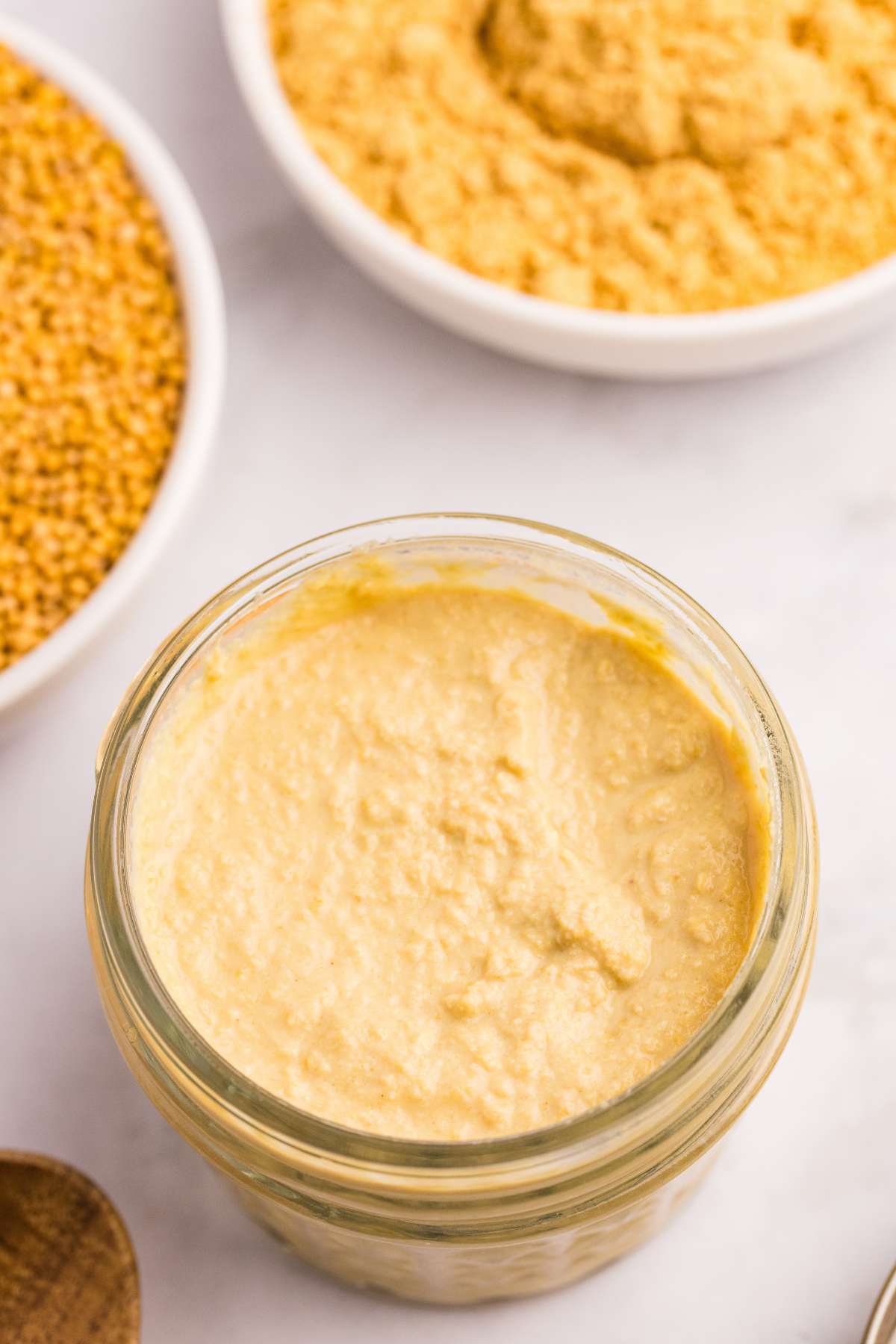
Jam and pickles get all the attention when you’re first learning to can, but pantry staples like this recipe can be the most practical.
Table of Contents
What You’ll Need
You can substitute with apple juice or grape juice for a non-alcoholic version. But to be honest, I think wine has the best flavor.
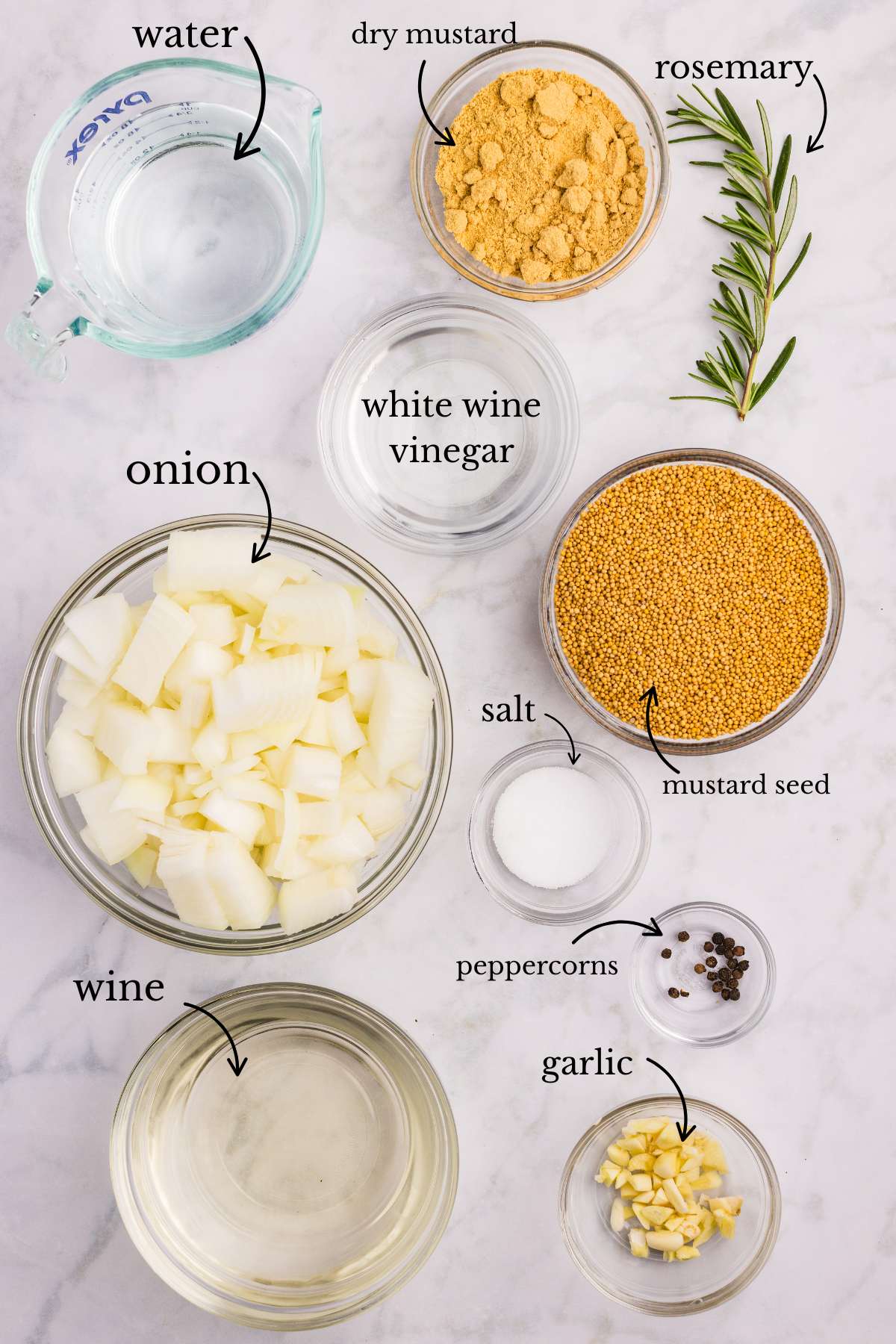
I always double this recipe because it’s the same amount of work and those little jars disappear fast around here. Just make sure your canner can fit all the jars: you might need to process in two batches if you’re tripling. The flavor stays exactly the same, so don’t worry about that!
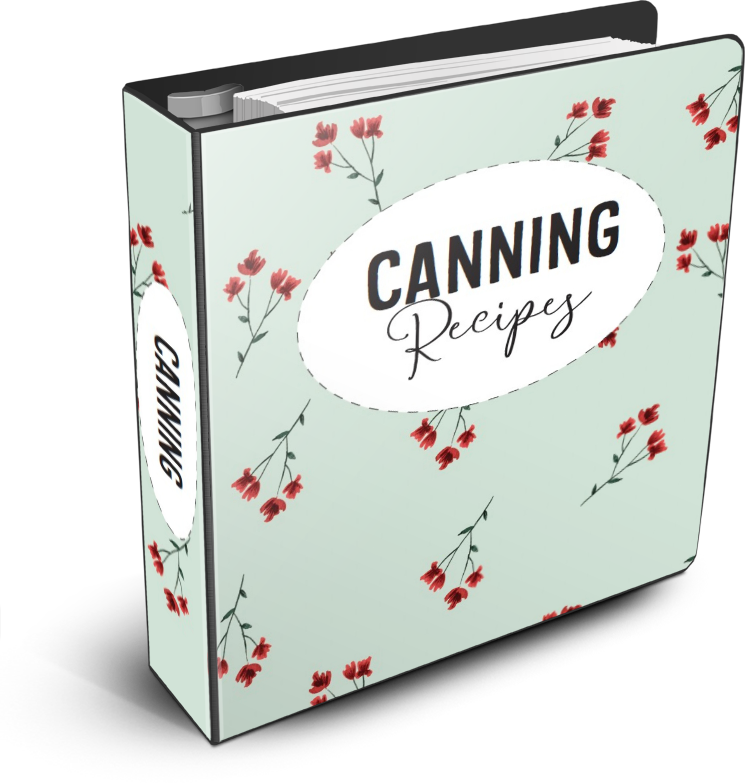
FREE FOR SUBSCRIBERS
Canning Binder
Subscribe (free!) to my newsletter to receive this PDF + dozens of others in my printable library. You’ll also get emails you’ll truly love, with a weekly meal and so much more.
For the Flavor Base:
- 2 cups chopped yellow onions, chopped (about 3 medium)
- 2 cups dry white wine – can substitute with apple juice or grape juice for non-alcoholic version
- 1 cup white wine vinegar – must be 5% acidity for safe canning
- 1 teaspoon salt
- 6 cloves garlic, chopped
- ¼ teaspoon whole black peppercorns
- 1 rosemary sprig (fresh) – or 2 teaspoons dried
For the Mustard
- 1 cup whole mustard seeds – yellow, brown, or black all work; color will vary
- ⅓ cup mustard powder
- 1-3 cups water – start with 1 cup and add more to reach desired consistency
Equipment
- Large pot (for simmering the flavor base)
- Fine-mesh strainer
- High-speed blender such as a Vitamix or regular blender (texture will be more rustic)
- 6 four-ounce mason jars with lids and rings
- Water bath canner or large pot deep enough to cover jars by 1 inch
- Jar lifter or tongs for safely removing hot jars
- Large mixing bowl
Step by Step Dijon Mustard
Making the Flavor Base
Start by getting all your aromatics into a large pot – the onions, wine, vinegar, salt, garlic, peppercorns, and that sprig of rosemary. This is where the magic happens! Most people skip this step and just soak their mustard seeds in plain liquid, but this flavored base is what makes this mustard special.
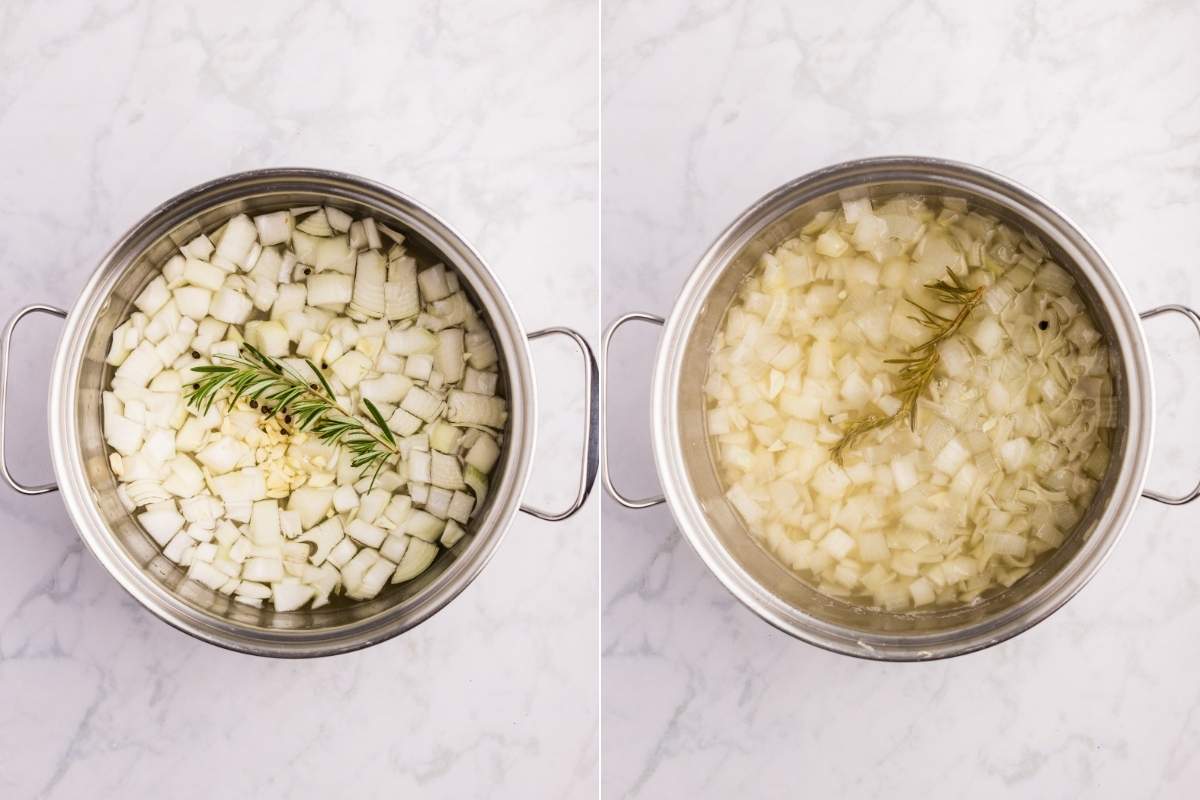
Bring everything to a boil over medium-high heat, then drop it down to a simmer. You’ll want to let this bubble away for 15-20 minutes until the onions are completely soft and translucent. Your kitchen is going to smell incredible – like you’re cooking something really special.
The onions need to be completely soft so all their sweetness gets pulled into the liquid.
Straining Out the Solids
Here’s where you separate the good stuff from the bits. Set a fine-mesh strainer over a large mixing bowl and pour that whole aromatic mixture through it. Press down on those solids with the back of a spoon to squeeze out every drop of the flavorful liquid.
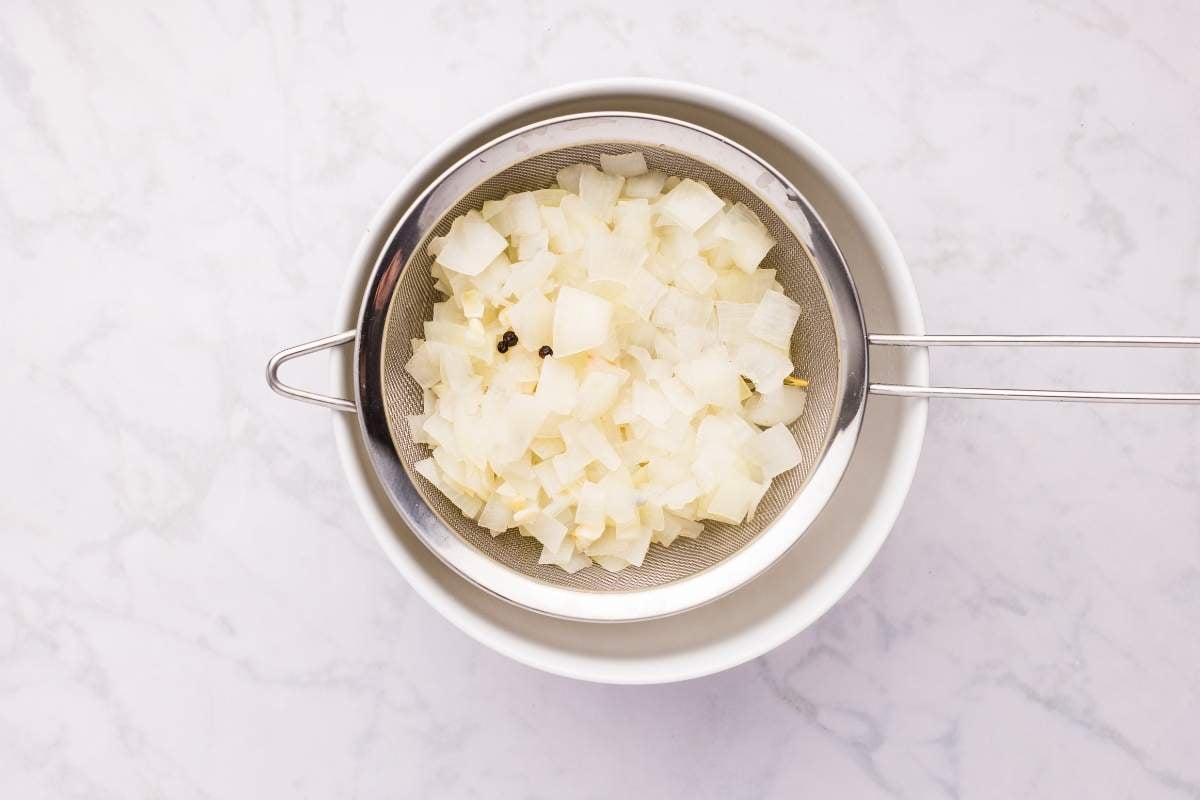
Toss the solids (they’ve done their job) and admire that beautiful, golden liquid you just created. That’s your mustard base right there. Woohoo!
The 24-Hour soak (Don’t Skip This!)
Add your whole mustard seeds and mustard powder right into that strained liquid. Give it a good stir, cover it up, and walk away for at least 24 hours. I know, I know – waiting is the hardest part.
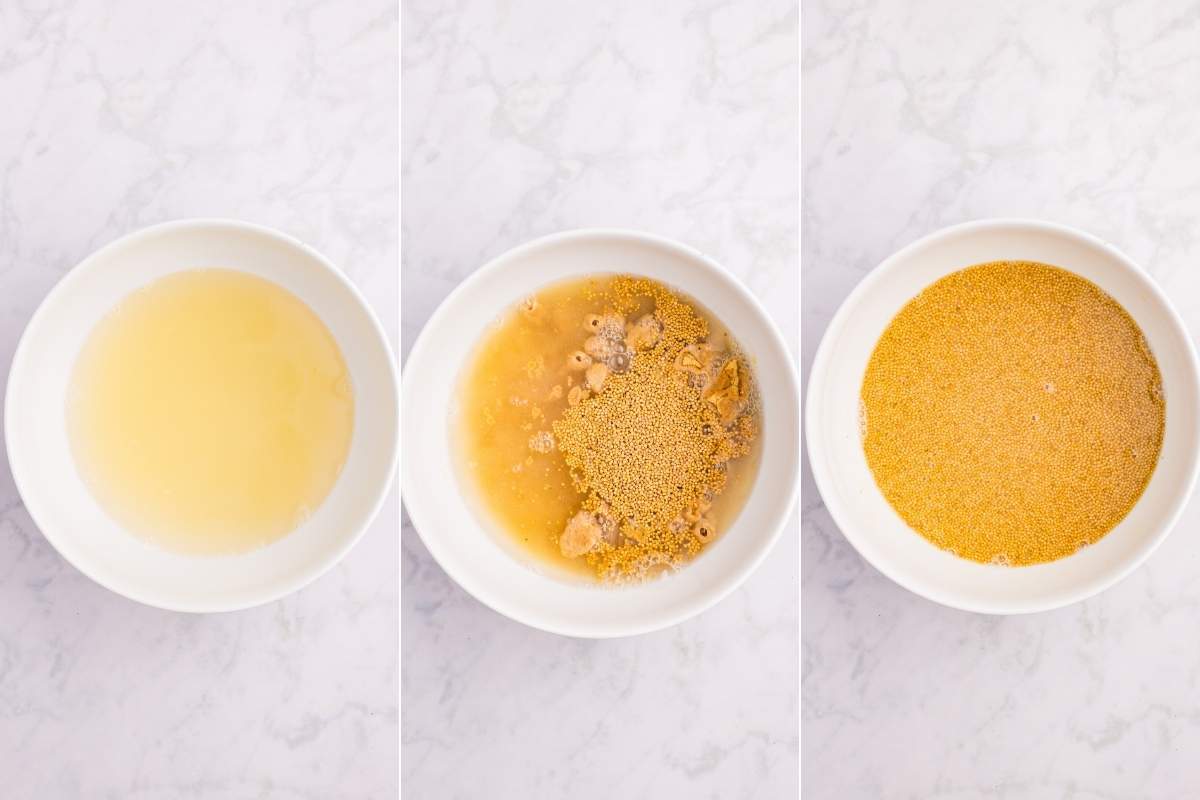
But here’s the thing: those mustard seeds need time to absorb all those flavors and soften up. Don’t rush or skip this step! You can let it sit up to 48 hours if life gets in the way.
Prep Your Jars (While You’re Waiting)
Get your canning jars squeaky clean with hot, soapy water. Then pop them into your water bath canner filled with water and let them simmer on medium heat. They need to be hot, but not sterilized.
Wash your lids and rings too, but just set those aside.
Blending Time
This is where your mustard transforms from chunky seed soup into that smooth, creamy goodness. Pour everything into your high-speed blender (this is not the time for that old blender you got as a wedding gift: you need power here).
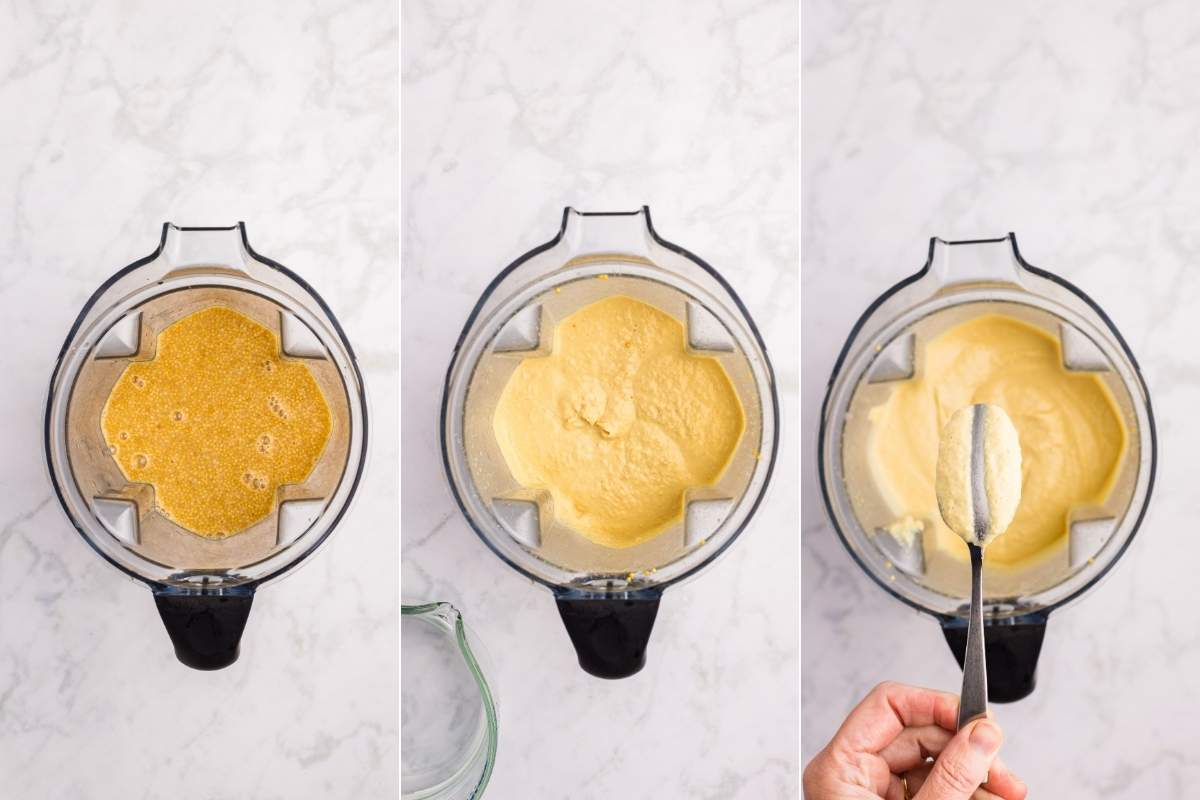
Start slow, then bump it up to medium speed. Once you’ve got a paste forming, add 1 cup of water. Then here’s the key: add more water slowly until you get the consistency you want. I usually use about 2 cups total, but you might like yours thicker or thinner.
You can always add more water, but you can’t take it back out. Go slow!
The Final Simmer
Transfer your beautiful mustard to a saucepan and bring it to a boil over medium heat, stirring constantly.
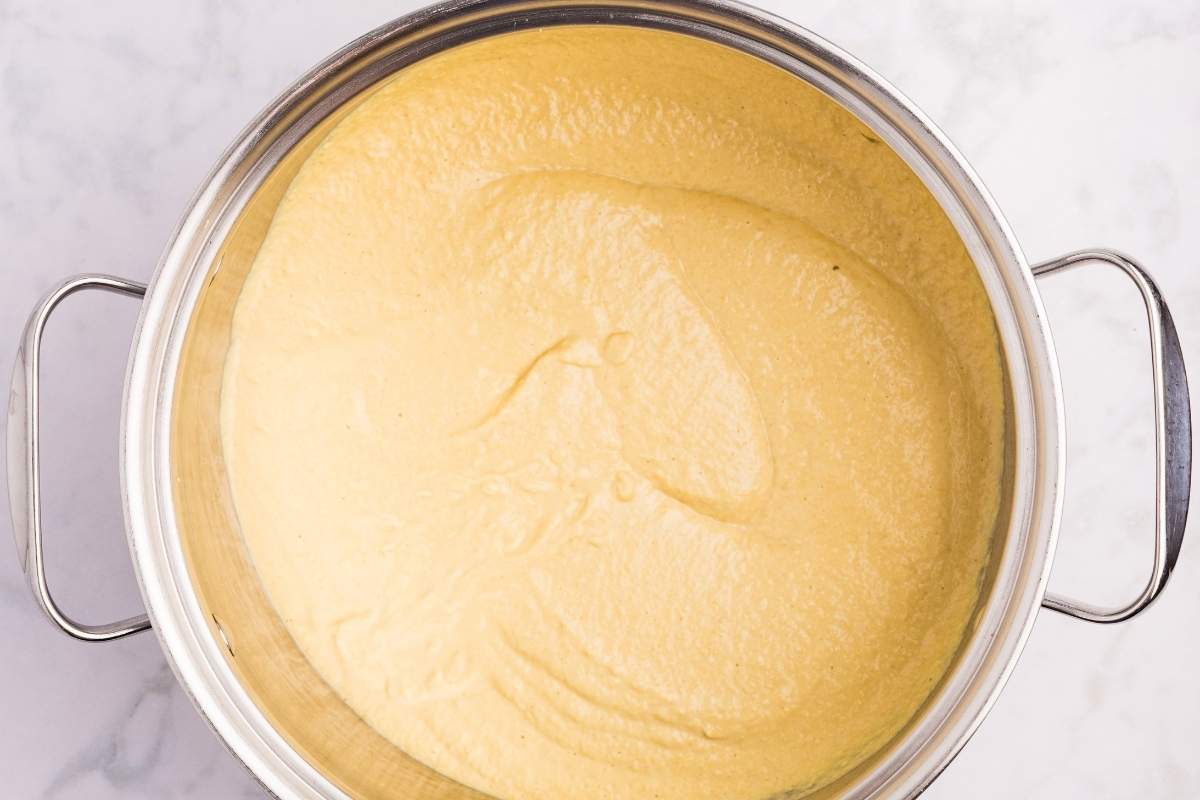
Once it’s bubbling, drop the heat and let it simmer for 5 minutes.
Filling
Ladle the hot mustard into your hot jars, leaving about ½ inch of headspace at the top. Run a clean knife around the inside edges to pop any air bubbles, then wipe those jar rims clean with a damp towel.
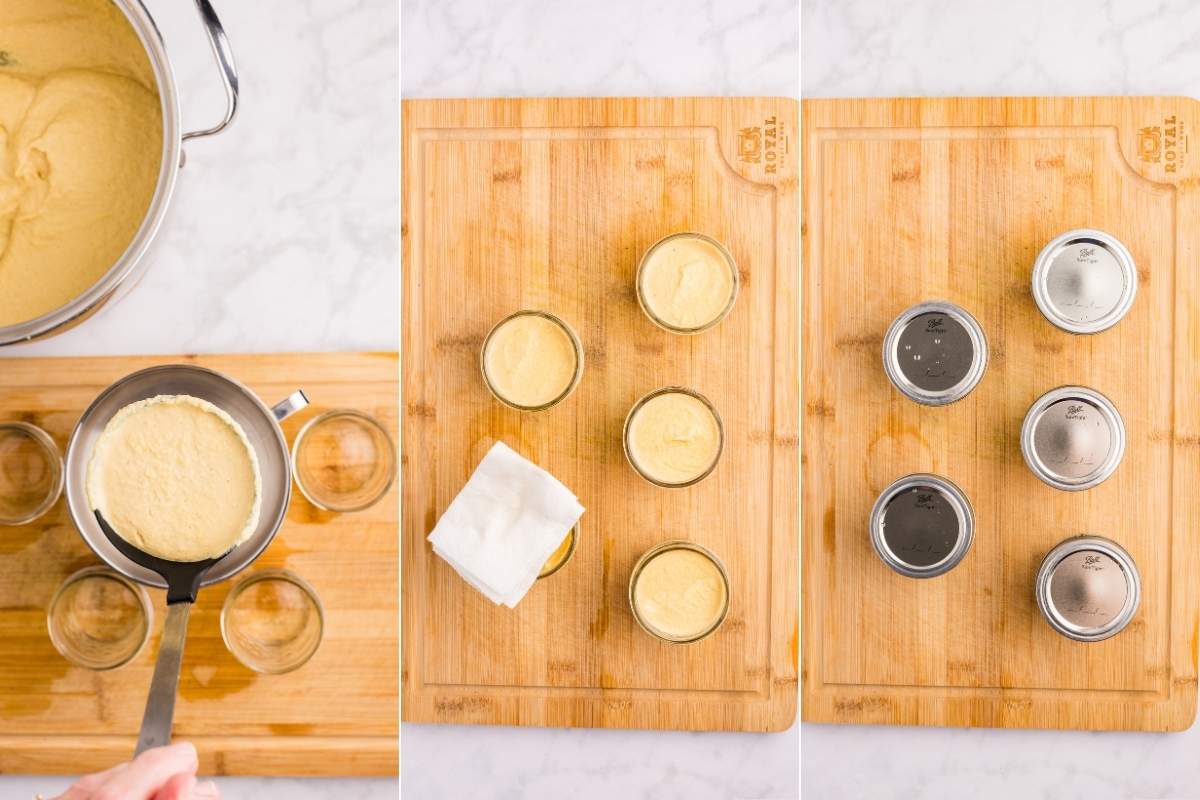
Pop on your lids and rings (fingertip tight), then into the water bath they go.
Processing
Make sure there’s at least an inch of water covering the tops of the jars.

Process for 10 minutes once the water comes to a rolling boil, then let them sit in the canner for 5 minutes before moving them to cool overnight.
You’ll hear those satisfying little “pop” sounds as the jars seal. Music to a canner’s ears!
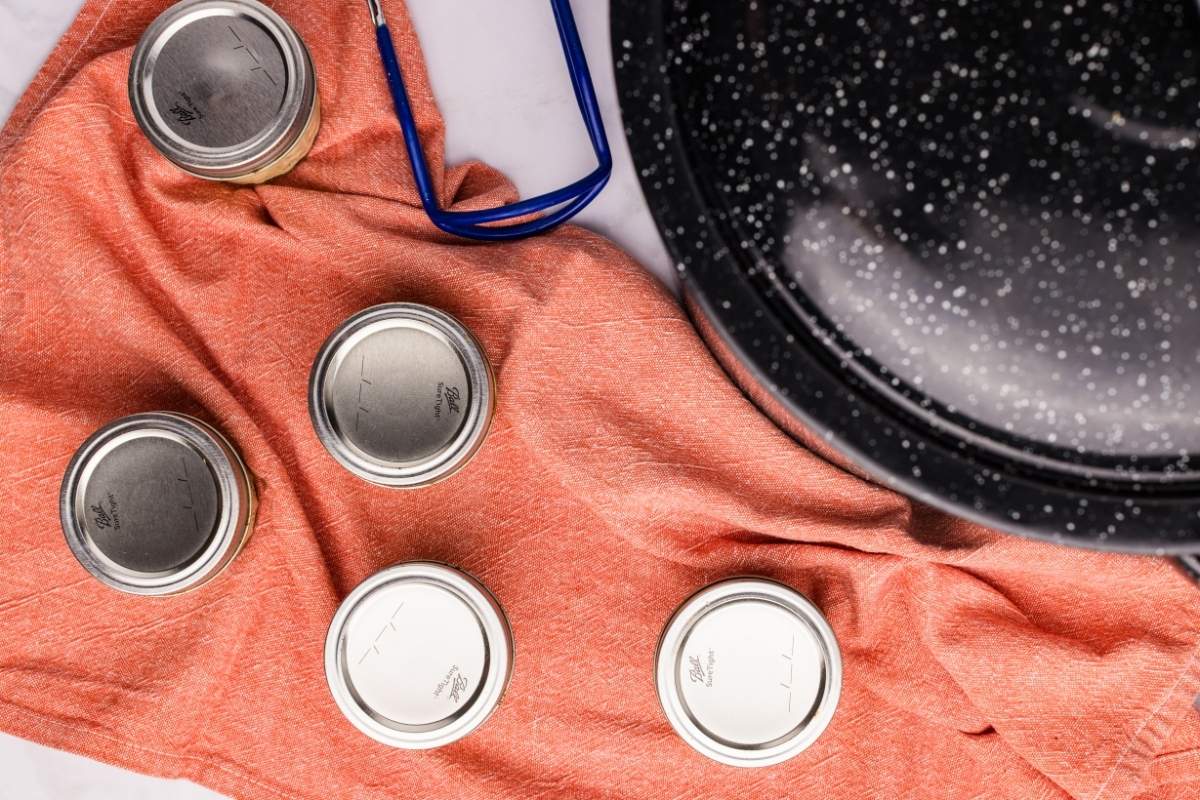
Store sealed jars in a cool, dark pantry for up to 18 months. Once opened, keep refrigerated and use within a year. The flavor actually gets better after a few weeks of aging!
How to Use it up
Spread it on sandwiches and burgers, whisk it into vinaigrettes and marinades, or use it as a glaze for roasted meats. It’s also perfect in potato salad, deviled eggs, and cheese boards.
For a super pretty gift basket, pair with gourmet crackers, some homemade chocolate-dipped shortbread, and a beautiful jar of homemade cherry jam. Put a pretty dish towel on top and you have a lovely present.
Questions and Troubleshooting
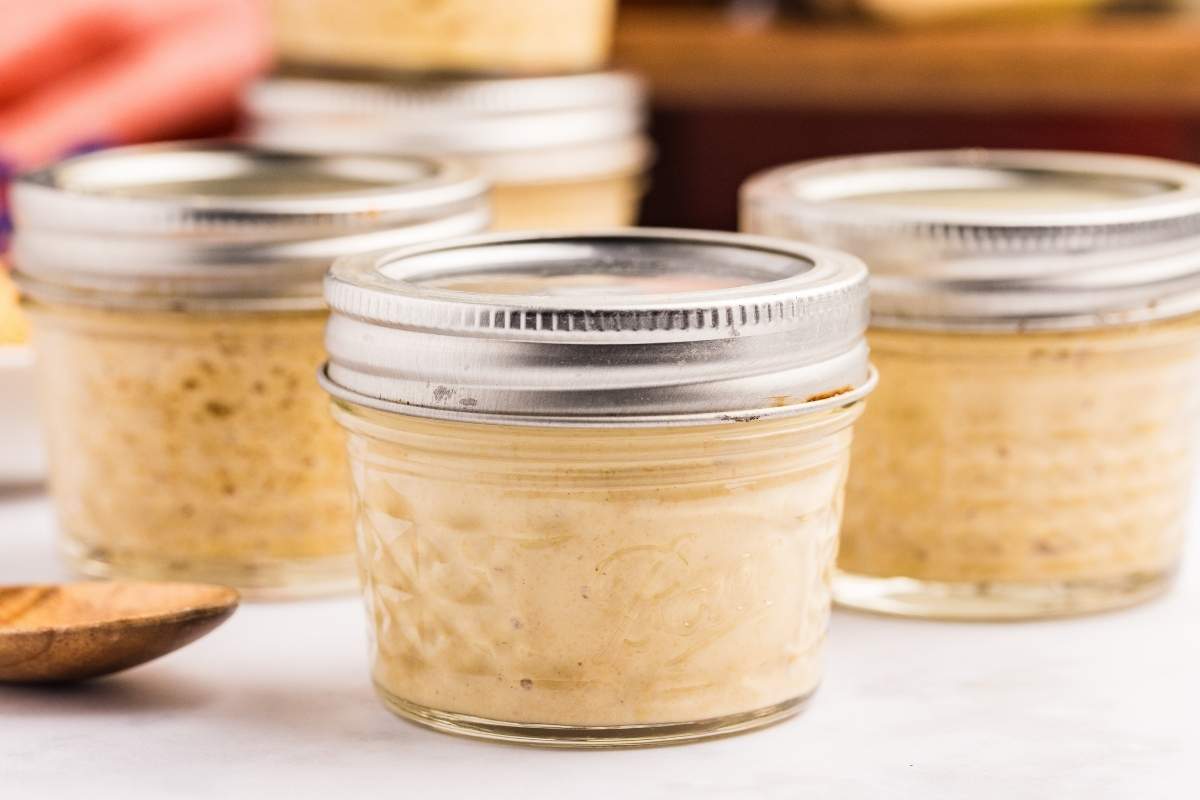
You can use a regular blender, but you’ll get a more rustic, grainy texture instead of that smooth, creamy consistency. Some people actually prefer it that way!
Absolutely! Just store it in clean jars in the fridge and use within 6 months. You’ll miss out on that long shelf life, but it tastes exactly the same.
You probably didn’t let the seeds soak long enough, or your vinegar was too strong. Next time, make sure to do the full 24-hour soak and taste your vinegar first.
Printable Recipe
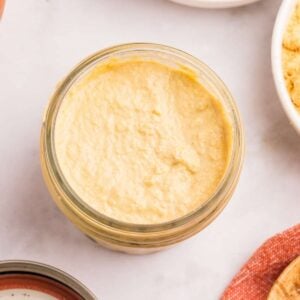
Homemade Dijon Mustard (Canning Recipe)
Equipment
- 1 Large pot
- 1 fine mesh strainer
- 1 high-speed blender
- 6 4-oz mason jars with lids and rings
Ingredients
- 2 cups yellow onions, chopped about 3 medium
- 2 cups dry white wine can substitute apple juice or grape juice
- 1 cup white wine vinegar 5% acidity
- 1 teaspoon salt
- 6 cloves garlic, chopped
- ¼ teaspoon whole black peppercorns
- 1 sprig fresh rosemary or 2 teaspoons dried
- 1 cup whole mustard seeds
- ⅓ cup mustard powder
- 1-3 cups water for thinning
Save This Recipe
You'll join my email list which you will love. And if you don't, unsubscribe in one click. ❤️
Instructions
- Cook base. In a large pot, combine onions, wine, vinegar, salt, garlic, peppercorns, and rosemary. Bring to a boil over medium-high heat, then reduce to simmer for 15-20 minutes until onions are soft.
- Strain and add mustard seed and powder. Strain mixture through fine-mesh strainer into large bowl, pressing solids to extract liquid. Discard solids. Add mustard seeds and mustard powder to strained liquid. Cover and let stand 24-48 hours.
- Prep for canning. Wash jars and place in water bath canner with water. Simmer to keep hot. Wash lids and rings, set aside.
- Blend. Transfer mustard mixture to high-speed blender. Blend starting slowly, then medium speed until paste forms. Add 1 cup water, then slowly add more water until desired consistency is reached.
- Heat Transfer to saucepan and bring to boil over medium heat, stirring constantly. Reduce heat and simmer 5 minutes.
- Fill jars. Ladle hot mustard into hot jars, leaving 1/2 inch headspace. Remove air bubbles, wipe rims clean. Apply lids and rings fingertip tight.
- Process in canner. Process in boiling water bath for 10 minutes. Remove from heat, let sit 5 minutes, then transfer jars to cool overnight. Let cool undisturbed until jars seal.
Notes



More to Explore
Hot Pepper Jelly Glazed Wings
Simple Homemade Marinara
How to Make Garlic Powder in a Dehydrator
Homemade Spiced Apple Rings (For Canning)